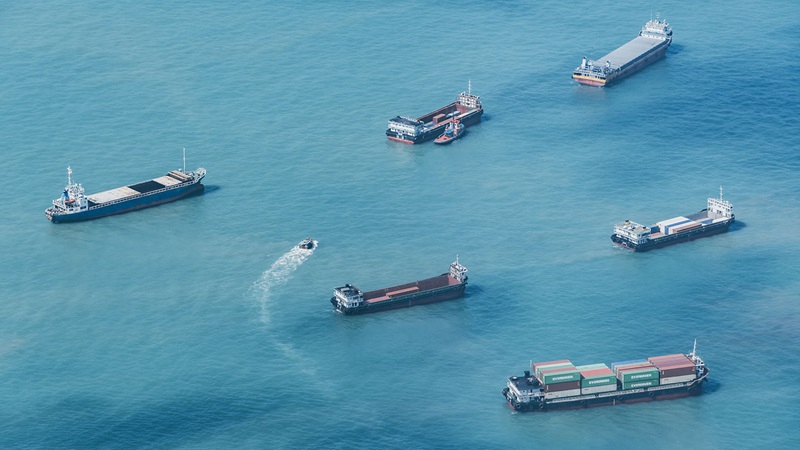International lessons for UK freeports
As an island nation, the UK has strong historical trading ties to the sea. To this day 95% of its trade volume comes through seaports. Only a small proportion travels by air. When the government released the list of new English Freeports, it was no wonder seven of the eight chosen were seaports (Felixstowe and Harwich; Humber; Liverpool City Region; Plymouth; Solent; Thames; Teesside), while just one was an airport – East Midlands.
It’s a critical function. However, the government’s decision to restart its Freeport programme with a new and improved focus and incentive structure for business isn’t just about boosting trade now that we have left the EU. The benefits are far greater, writes Mace’s Director for Strategic Advisory, Paul Kelly.
UK Freeports will take the best bits of global examples – there are estimated to be some 3,500 Freeports worldwide employing 66 million people – to create a wider, bespoke model. As the Chancellor of the Exchequer, Rishi Sunak, a keen advocate for Freeports, said they “will create national hubs for trade, innovation and commerce, levelling up communities across the UK, creating new jobs, and turbo-charging our economic recovery.”
So, what lessons can the UK learn from the international competition if Freeports are to truly turbo-charge our economy?
Good infrastructure
The success of some of the most accomplished Freeports in the world is due to the quality and reliability of their infrastructure. This includes having the right facilities in place, within easy reach, to support the type, number and size of businesses located within them – e.g. warehousing, logistics and even leisure.
Good infrastructure is especially important for manufactured goods that need to be quickly and efficiently delivered. Those Freeports served by reliable motorways, efficient link roads, railways and freight terminals will reap the rewards.
Land ready for development
As well as the financial incentives – mainly tax reductions or reliefs – offered to businesses within UK Freeport zones, availability of land and assets to invest in, such as office buildings, commercial and residential space, is crucial.
Once the UK Freeports are up and running, the government shouldn’t be afraid to expand the land available for its Freeports. This will attract SMEs and start-ups looking to locate near to existing and established supply chains.
And of course, the government needs to make good on its commitment to simplify the planning rules around Freeports. This should not be at the expense of the net zero agenda where investing in world-class Freeports should be synonymous with decarbonisation and greening our economy.
Intelligent logistics
Jebel Ali Free Zone in Dubai, arguably the most successful in the world, is home to over 16,000 businesses, supports 135,000 jobs and contributes over 23.8% to the GDP of Dubai. Its latest innovation is the piloting of an intelligent High Bay Storage (HBS) system, storing containers in a stacked grid system eleven storeys high, cutting the normal space required for a conventional terminal by two thirds.
If UK Freeports are to compete with the best in the world, most will need to upgrade the enabling technology that improves their efficiency, speed, and capacity. This will mean they can attract and support the very best Industry 4.0 clients, as in the Daegu-Gyeongbuk Free Economic Zone in South Korea.
Digitisation and streamlining
Linked to hard infrastructure is the need for superior digital infrastructure. If we are to make the most of the UK’s Freeports in a highly competitive global economy, we need to invest heavily in digital transformation. This includes prioritising Freeports for 5G – like the world’s first 5G economic zone at Łódz in Poland – using the latest generation fibre and technology at our disposal to make the administration processes easier for Freeport clients.
Using technology to streamline services in and around Freeports will also boost their chances of success. The Dubai Multi Commodities Centre in the UAE has vastly reduced bureaucracy around how businesses are set up there. This includes streamlined onboarding and approval processes, and online tools for businesses to estimate the cost of relocating there. Similarly, the Tanger Med Zones in Morocco attracts numerous investors through its highly valued ‘plug and play’ model.
A highly qualified labour market
As part of the government’s levelling-up agenda, UK Freeports are located in areas of high deprivation in the hope of promoting their regeneration. What tends to come with high levels of deprivation is poor educational outcomes, yet the world’s most successful Freeports have thrived where they have had access to a highly qualified labour market.
The Zona Franca de Bogotá, in Colombia and Łódź Special Economic Zone in Poland have made a point of supporting accelerators and catapults within their Freeports. Training, specific to Freeport activity, such as in logistics, trade and tax and accounting, have been hugely successful, as well as offering training vouchers for SME employees.
Both government and Freeports must strike the critical balance between attracting an existing skilled workforce and providing local people with the right opportunities and support to enter into roles and develop the skills needed to make Freeports a success, both operationally and in the context of regional growth.
Long-term marketing
Freeports need to attract the right sort of organisations and activities to their area, so their benefits need to be clearly articulated across the business community. UK Freeports will need to promote themselves globally to the right partners in order to attract investors, both from national governments and multinational enterprises, and they will need to learn to collaborate and share knowledge. This all takes time.
The UK is already streets ahead with many of the factors that businesses and investors are looking for, including a reliable legal system, stable regulation, common business language and access to some of the best universities in the world.
If the UK government and the eight chosen Freeports follow these six principles, they will have a far greater chance of delivering on their promise and transforming sometimes overlooked areas of our country. As former Prime Minister David Lloyd George, said: “No human system is perfect, but the system of Freeports with all its faults has built up for us the greatest international trade in the world.” Let’s hope this is as relevant now as it was in 1931.











